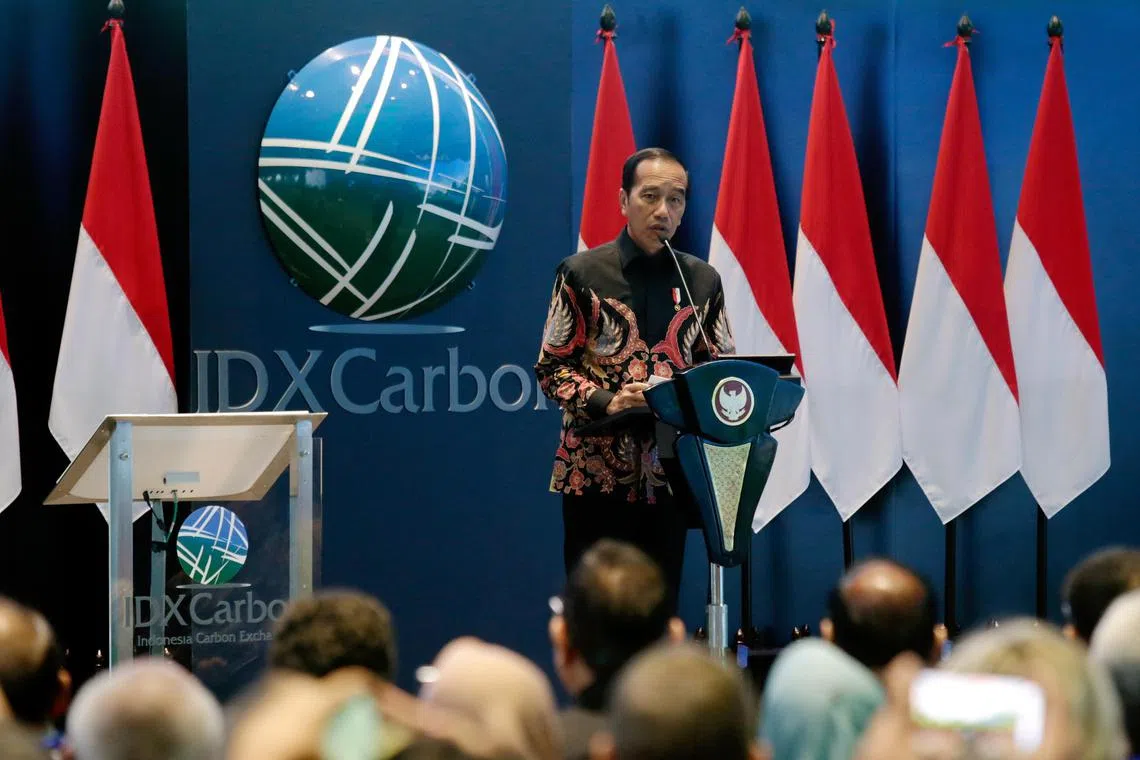Indonesia launches carbon trading in bid to tame coal
Sign up now: Get insights on Asia's fast-moving developments

Indonesian President Joko Widodo gives an address during the opening ceremony of Indonesia Carbon Exchange in Jakarta on Sept 26.
PHOTO: EPA-EFE
JAKARTA – Indonesia has launched its first carbon emissions trading market
An initial 13 transactions covering 459,914 tonnes of carbon dioxide equivalent (CO2e) from PT Pertamina Geothermal Energy’s projects in North Sulawesi were traded at Tuesday’s opening. Credits traded at a price of 69,600 rupiah per tonne, according to a trading board at the Indonesia Stock Exchange, which facilitates the trade. That is far below the cost of similar products in established emissions markets like the European Union.
The buyers were some of Indonesia’s largest banks, such as Bank Central Asia and Bank Mandiri, other units of state energy firm Pertamina and companies in the mining sector, among others.
President Joko Widodo said Indonesia has tremendous potential for carbon reduction efforts, particularly nature-based solutions, and its carbon market could grow to 3,000 trillion rupiah (S$266 billion).
“I am very optimistic that Indonesia can become the world’s carbon (market) axis as long as concrete steps are taken consistently and jointly by all stakeholders,” Mr Widodo said during the launch.
In its initial stage, trading will be voluntary, but the government is working on a plan for further national regulations on pollution, which will include a carbon tax, Mr Luhut Pandjaitan, Coordinating Investment and Maritime Affairs Minister who oversees regulations for carbon pricing, said at the launch.
Some of Indonesia’s biggest coal power plants have been trading emission allowances since February.
Initial trading is open to coal plants generating at least 100 megawatts of power and that are linked to state utility Perusahaan Listrik Negara’s grid, which accounts for about 86 per cent of the Indonesia’s coal capacity.
The IDXCarbon exchange will aim to incentivise utilities to cut pollution by setting an emissions cap for the power plants and allowing them to trade any unused credits. The South-east Asian nation sees a potential economic gain of as much as 3,000 trillion rupiah from the sale of carbon credits, President Widodo said at the launch event.
Indonesia is aiming to zero out its emissions by 2060
“This is just the beginning, so we’re not expecting immediate big interest from the domestic market,” said Mr Paul Butarbutar, executive director at the Indonesia Centre for Renewable Energy Studies think-tank. “But it is hoped that as time goes by, and with better dissemination, the domestic carbon exchange will further grow.”
Governments across Asia are putting prices on emissions, though the region’s carbon markets have so far fallen short of delivering any meaningful impact. Prices in South Korea and China are regarded as still below the level needed to compel large corporate emitters to cut pollution. BLOOMBERG, REUTERS


